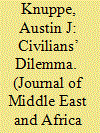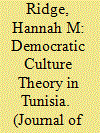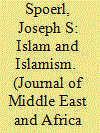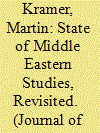|
|
|
Sort Order |
|
|
|
Items / Page
|
|
|
|
|
|
|
| Srl | Item |
| 1 |
ID:
191892


|
|
|
|
|
| Summary/Abstract |
How did Iraq’s ethnic and religious minorities survive the Islamic State (ad-Dawlah al-Islāmiyah, IS) occupation of Ninewa Governorate? Existing accounts of wartime survival either essentialize social identity or ignore it altogether by reducing survival to cost-benefit calculations or political opportunism. Against the conventional wisdom, this article argues that individuals survive conflict by drawing on repertoires – consisting of practices, tools, organized routines, symbols, and rhetorical strategies – to navigate violent situations. Distinct from deliberate calculations or rational strategies, repertoires are creative, flexible, and often contradictory. The author examines Iraqis’ reliance on survival repertoires through a mixed-methods research design of observational data and fieldwork. This study begins by analyzing migration patterns recorded in the United Nation’s Displacement Tracking Matrix. To understand how Iraqis who remained survived the conflict, this work draws on original interviews with Iraqi peacebuilders from minority communities. While most minorities fled during the IS offensive of June 2014, those who remained pursued various forms of cooperation, contention, and neutrality. This research finds that those who remained survived the conflict by mobilizing self-defense groups and by their coordination with members of the anti-IS coalition. Opportunistic collaboration with IS insurgents during the initial stages of the occupation was less common. In areas where the Iraqi Security Forces (al-Quwāt al-Maslahah al-ʿIrāqiyya, ISF) or Peshmerga were absent, residents mobilized community militias unaligned from Baghdād or Arbīl. The findings of this research provide insights for scholars and practitioners interested in peacebuilding, transitional justice, and post-conflict reconstruction in fragile states.
|
|
|
|
|
|
|
|
|
|
|
|
|
|
|
|
| 2 |
ID:
191893


|
|
|
|
|
| Summary/Abstract |
For a decade, Tunisia was identified as a democratic enclave in a non-democratic region. This article examines public opinion in Tunisia in the context of democratic culture theory. Using a 2021 survey study and cluster analysis it finds that support for electoral democracy is separable from support for liberal values. There are liberal democrat and liberal non-democrat populations. Overall, the democratic culture outstrips the support for democratic elections.
|
|
|
|
|
|
|
|
|
|
|
|
|
|
|
|
| 3 |
ID:
191891


|
|
|
|
|
| Summary/Abstract |
In his 2012 book Islamism and Islam, Bassam Tibi argues that Islamism, a political ideology, is quite distinct from Islam, which he defines as a religion focused on faith and spirituality. This article analyzes and evaluates the six arguments that Tibi advances for this thesis and finds all of them unconvincing. The main problem with Tibi’s case is that it ignores the figure of Muḥammad, whom Islamic sources uniformly portray as someone who fused politics and religion and sought to overthrow a non-Islamic socio-religious order and to replace it with an Islamic one. For mainstream Muslims, Muḥammad is the perfect role model who possessed divinely granted infallibility against sin and error. Due to Muḥammad’s example, as enshrined in classical Islamic sources, Islamists have a strong claim to be following orthodox Islamic principles when they embrace an ideology in which religion and politics are tightly intertwined. The article concludes with some tentative suggestions as to how a Muslim reformer like Tibi might develop more promising arguments for a progressive form of Islam.
|
|
|
|
|
|
|
|
|
|
|
|
|
|
|
|
| 4 |
ID:
191894


|
|
|
|
|
| Summary/Abstract |
Employing a historical perspective and using documents from the Ottoman archives, this article focuses on the recognition of the Vlachs as millet by the Sultan Abdülhamid in 1905. It examines in detail the policies of the Sublime Porte, Romania, and the Ecumenical Patriarchate, which was the highest body within Orthodox Christianity. The study also tries to show the common fate of the Ecumenical Patriarchate and the Ottoman Empire in the face of rising nationalisms and the Ottoman “breaking no squares” policy toward to the Ecumenical Patriarchate. From 1878, newly independent Romania had initiated a paternalistic policy in support of the Vlachs of Macedonia including their desire to gain recognition of their right to have their own schools, churches, clerics, and so on. Yet, seeking this objective exacerbated already existing nationalist conflicts in the region among the Serbs, Bulgarians, and Greeks. The setting for this rivalry was mainly Salonica, Bitola, and the Ioannina provinces. This article argues that when Alexandru Lahovary arrived in Istanbul in 1902 as the new Romanian diplomatic representative he had as his major aim obtaining Ottoman recognition of the Vlachs as a millet, like the Greeks, Armenians, Bulgarians, and other minorities already enjoyed. Remarkably, Lahovary’s determined diplomatic and other efforts achieved his target in a mere three years. Still, after the Balkan Wars, Greece emerged as the real winner, and captured a huge part of Macedonia, which effectively took the Vlachs off the Balkan agenda.
|
|
|
|
|
|
|
|
|
|
|
|
|
|
|
|
| 5 |
ID:
191890


|
|
|
|
|
| Summary/Abstract |
This keynote address to the 2022 Association for the Study of the Middle East and Africa (ASMEA) conference assesses the health of Middle Eastern studies in the United States, according to three parameters first defined by ASMEA co-founder Bernard Lewis in 1979: standards, politicization, funding. In all three areas, the field remains plagued by endemic problems.
|
|
|
|
|
|
|
|
|
|
|
|
|
|
|
|
|
|
|
|
|